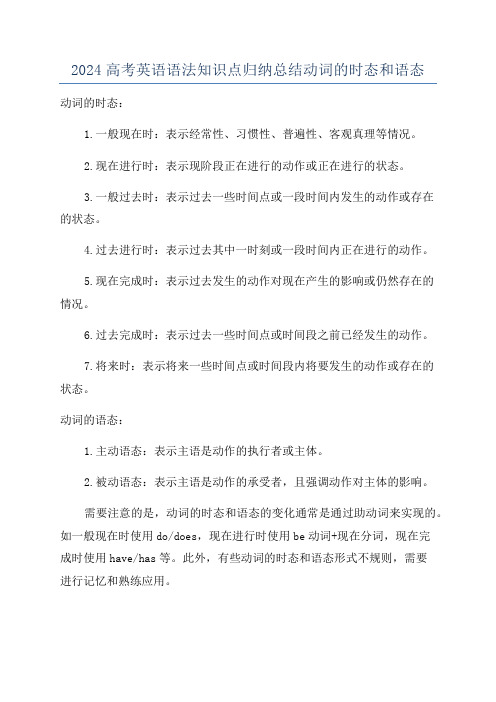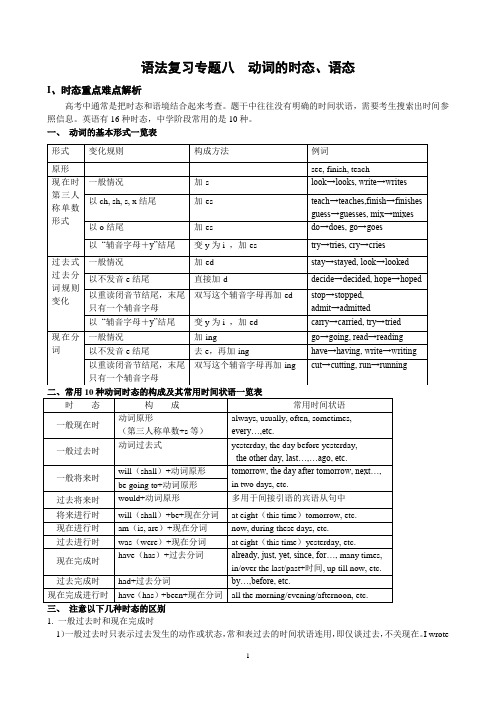最新高考英语专题复习精品资料—语法复习八:动词时态和语态 16开
- 格式:doc
- 大小:84.55 KB
- 文档页数:10

2024高考英语语法知识点归纳总结动词的时态和语态
动词的时态:
1.一般现在时:表示经常性、习惯性、普遍性、客观真理等情况。
2.现在进行时:表示现阶段正在进行的动作或正在进行的状态。
3.一般过去时:表示过去一些时间点或一段时间内发生的动作或存在
的状态。
4.过去进行时:表示过去其中一时刻或一段时间内正在进行的动作。
5.现在完成时:表示过去发生的动作对现在产生的影响或仍然存在的
情况。
6.过去完成时:表示过去一些时间点或时间段之前已经发生的动作。
7.将来时:表示将来一些时间点或时间段内将要发生的动作或存在的
状态。
动词的语态:
1.主动语态:表示主语是动作的执行者或主体。
2.被动语态:表示主语是动作的承受者,且强调动作对主体的影响。
需要注意的是,动词的时态和语态的变化通常是通过助动词来实现的。
如一般现在时使用do/does,现在进行时使用be动词+现在分词,现在完
成时使用have/has等。
此外,有些动词的时态和语态形式不规则,需要
进行记忆和熟练应用。

语法复习讲练八:动词时态与语态(1)一、动词的分类和形式:动词是表示动作和状态的词。
动词有时态、语态和语气3种形式的变化。
1、动词按其能否独立作谓语而分为:“谓语动词”和“非谓语动词”两种2、动词的4种基本形式:动词原形、过去式、过去分词和现在分词。
3、动词按其构成动词词组作用分为:实义动词、连系动词、情态动词和助动词。
1)实义动词分为及物动词和不及物动词。
还可分为持续性动词和瞬间动词;2)连系动词有两种:一种表特征或状态,另一种表状态变化过程。
4、五种不同的短语动词:1)“动词+介词”;2)“动词+副词”;3)“动词+副词+介词”;4)“动词+名词(或代词)+介词”;5)“be+形容词(包括相当于形容词的过去分词+介词”。
二、动词的时态:1、一般现在时的用法:1)表示现在的习惯,经常发生的动作或存在的状态。
2)表示主语的特征、性格和能力。
3)表示客观事实或真理。
4)表示按照计划安排好的将来行为。
(只限于是go,come, leave, start, stop, be等开始或移动意义的词。
)2、一般过去时的用法:1)表示过去的动作或状态。
2)叙述过去连续发生的事情。
3)表示过去一段时间内经常发生的动作。
3、一般将来时的用法:1)表示将来的动作或状态。
2)表示将来的经常动作。
4、现在进行时的用法:1)表示说话时正在进行的动作。
2)表示现阶段正在进行的动作。
(说话时动作不一定进行。
)5、过去进行进的用法:1)过去某一时刻或某一段时间内正在进行的动作。
2)表示移动的动词:come, start, stay, leave, go等词的过去进行时可以表示过去的将来要发生的动作。
3)was going to do可以表示在过去某一时间之后发生的动作。
6、现在完成时的用法:1)表示刚刚完成的动作,常与just连用。
2)表示过去发生而持续到现在的动作或状态,甚至延续到将来。
常与since, for连用,但for, since不能与终止性的动词连用。

(一)动词的时态时态动词是谓语动所表示的动作或情况发生时间的各种形式。
英语动词有16种时态,但是常用的只有9种:一般现在时、一般过去时、一般将来时、现在进行时、过去进行时、现在完成时、过去完成时、过去将来时、现在完成进行时。
下面分别介绍。
1、一般现在时的用法(do/does)1)表示经常性、习惯性的动作;表示现在的状态、特征和真理。
句中常用often, usually, every day, sometimes, every week/year, twice aweek 等时间状语。
例如:a. He goes to school every day.b. He is very happy.c.The earth moves around the sun.2) 在时间状语从句和条件状语从句中,用一般现在时表示将来。
例如:a. If you come this afternoon, we’ll have a meeting.b. When I graduate, I’ll go to countryside.3) 有时这个时态表示按计划、规定, 按时间表要发生的动作(句中都带有时间状语),但限于少数动词,如:begin, come, leave, go ,arrive, start , stop, return, open, close等。
例如:a.the meeting begins at seven.b.the rain starts at nine in the morning.4) 表示状态和感觉的动词(be, like, hate, think, remember, find, sound 等)常用一般现在进行时。
a.i like english very much.b.the story sound very interesting.5) 书报的标题、小说等情节介绍常用一般现在时。
2.一般过去时的用法(did)1)表示过去某时间发生的事、存在的状态或过反复发生的动作。

高考必考语法精讲精练语法专题八:动词的时态和语态动词的时态和语态是高考必考考点。
时态(tense)是一种动词形式,同一动词的不同变化形式表达不同的时态,英语中有16种时态。
《2017年普通高等学校招生全国统一考试大纲》附录语法项目表中对于时态列了十项:(1)一般现在时(2)一般过去时(3)一般将来时(4)现在进行时(5)过去进行时(6)过去将来时(7)将来进行时(8)现在完成时(9)过去完成时(10)现在完成进行时;此外还列了被动语态,并将其作为单独一项。
2015年高考全国卷Ⅰ第61题(语法填空)考查了动词arrive的一般过去时arrived;第71题(短文改错)考查了think变为过去时thought;第75题(短文改错)考查了被动语态,删掉been;第79题(短文改错)考查了将动词过去时的found变为现在时的find。
2016年高考全国卷Ⅰ第62题(语法填空)考查了allow的一般过去时的被动语态was allowed;第74题(短文改错)考查了将过去时had变为现在时的have;77题(短文改错)考查了将using变为被动used。
2017年高考全国卷Ⅰ第64题(语法填空)考查了remove的一般现在时的被动语态are removed;第74题(短文改错)考查了将动词goes变成一般过去时went。
各种时态构成表:(以do为例)一、一般现在时:动词原形或第三人称单数1.构成:使用动词原形,第三人称单数须有变化。
(1)直接加“s”:work→works,take→takes(2)以辅音加“y”结尾,变“y”为“i”,再加“es”:carry→car ries(3)以“o, s, x, ch, sh”结尾的动词加“es”:go→goes,dress→dresses,watch→watches,finish→finishes2.功能:(1)表现在的事实、状态或动作。
例如:①I have a dream.②She loves music.③Mary's parents get up very early.(2)表习惯性动作或职业,常与often,sometimes,usually,always,every week,occasionally,frequently,seldom 等时间副词连用。

语法复习专题八动词的时态、语态I、时态重点难点解析高考中通常是把时态和语境结合起来考查。
题干中往往没有明确的时间状语,需要考生搜索出时间参照信息。
英语有16种时态,中学阶段常用的是10种。
一、动词的基本形式一览表1. 一般过去时和现在完成时1)一般过去时只表示过去发生的动作或状态,常和表过去的时间状语连用,即仅谈过去,不关现在。
I wrotea letter this morning. (只说明写了一封信的事实)2)现在完成时表示过去发生的动作或状态,但和现在有联系,可能刚结束,也可能继续下去。
不能和表过去的时间状语连用,译成汉语时可加“已经”。
I have written a letter this morning. (我已经写了一封信,有继续写第二封的可能,现在还是早上。
)2. 一般过去时和过去进行时1)一般过去时侧重于说明发生某动作的事实。
It rained heavily last night.昨晚雨下得很大。
(强调下雨,并不强调持续时间)2)过去进行时侧重于强调某动作的持续过程或表示动作在进行。
It was raining cats and dogs last night昨晚整整一夜都在下倾盆大雨。
(强调没停,一直持续)3. 现在完成时和现在完成进行时1) 现在完成时在含义上着重表示动作的结果。
I have read that book. (已读完)2)现在完成进行时着重表示动作一直在进行,即动作的延续性。
I have been reading that book all the morning.( 还没读完)注:It is/was +时间段since从句(从句的谓语动词如果是持续性动词:表示自从某人不做某事已多久了:It is/was +时间段since从句(从句的谓语动词如果是短暂性动词:表示自从某人做某事以来已多久了:Eg: It is ten years since he came here. 他来这儿已10年了。

高中英语语法(时态和语态)一.动词的时态时态是谓语动词所表示的动作或情况发生时间的各种形式。
英语动词有16种时态,但是常见的只有九种:一般现在时、一般过去时、一般将来时、现在进行时、过去进行时、现在完成时、过去完成时、过去将来时、现在完成进行时。
(一)一般现在时(do / does)1.具体用法1) 表示经常性或习惯性动作We always care for each other and help each other. 我们总是互相关心互相帮助。
He goes to school every day.2)表示现在的特征或状态He is very happy.Do you sing? ----A little.3)表示普遍真理Light travels faster than sound. 光速比声速快。
Actions speak louder than words. 行动胜过言语。
* 常与一般现在时态连用的词或短语主要有:often, usually, sometimes, every day,every morning/afternoon, on Sundays/weekends等等。
I often go to the cinema on Sundays. 我经常星期天去看电影。
He goes to work early every day. 他每天上班很早。
(二)一般过去时( did )(1)表示过去某一特定时间所发生的、可完成的动作或状态,常与表示确切过去时间的词、短语或从句连用。
例如:We went to the pictures last night and saw a very interesting film.(2)表示过去习惯性动作。
例如:He always went to class last.I used to do my homework in the library.(三)一般将来时( will / shall do)1)表示将来打算进行或期待发生的动作或状态。
语法复习八:动词时态和语态(1)一、动词的分类和形式:动词是表示动作和状态的词。
动词有时态、语态和语气3种形式的变化。
1、动词按其能否独立作谓语而分为:“谓语动词”和“非谓语动词”两种2、动词的4种基本形式:动词原形、过去式、过去分词和现在分词。
3、动词按其构成动词词组作用分为:实义动词、连系动词、情态动词和助动词。
1)实义动词分为及物动词和不及物动词。
还可分为持续性动词和瞬间动词;2)连系动词有两种:一种表特征或状态,另一种表状态变化过程。
4、五种不同的短语动词:1)“动词+介词”;2)“动词+副词”;3)“动词+副词+介词”;4)“动词+名词(或代词)+介词”;5)“be+形容词(包括相当于形容词的过去分词+介词”。
二、动词的时态:1、一般现在时的用法:1)表示现在的习惯,经常发生的动作或存在的状态。
2)表示主语的特征、性格和能力。
3)表示客观事实或真理。
4)表示按照计划安排好的将来行为。
(只限于是go,come, leave, start, stop, be等开始或移动意义的词。
)2、一般过去时的用法:1)表示过去的动作或状态。
2)叙述过去连续发生的事情。
3)表示过去一段时间内经常发生的动作。
3、一般将来时的用法:1)表示将来的动作或状态。
2)表示将来的经常动作。
4、现在进行时的用法:1)表示说话时正在进行的动作。
2)表示现阶段正在进行的动作。
(说话时动作不一定进行。
)5、过去进行进的用法:1)过去某一时刻或某一段时间内正在进行的动作。
2)表示移动的动词:come, start, stay, leave, go等词的过去进行时可以表示过去的将来要发生的动作。
3)was going to do可以表示在过去某一时间之后发生的动作。
6、现在完成时的用法:1)表示刚刚完成的动作,常与just连用。
2)表示过去发生而持续到现在的动作或状态,甚至延续到将来。
常与since, for连用,但for, since不能与终止性的动词连用。
3)表示过去的动作对现在造成的影响或结果。
7、现在完成时与一般过去时的区别:1)现在完成时与现在有联系,它表示过去的动作对现在所产生的结果、影响。
一般过去时通常表示在过去某一具体时间发生的动作,与现在没什么联系。
2)现在完成时表示过去延续到现在的行为;一般过去时着重过去某一时刻的某一具体动作。
8、过去完成的用法:1)表示在过去某一或动作之前已经完成的动作。
常与by, before 等介词短语或一个状语从句或上下文暗示。
2)表示由过去某一时间开始,一直延续到过去另一时间的动作,常和for(有时可省去)或since 构成的短语或since引导的从句连用。
9、过去将来时的用法:表示对于过去某一时刻而言将要发生的动作或存在的状态。
练习一:动词时态与语态(1)1. When I saw Mary, she ______ on the piano.A. is playingB. playsC. was playingD. played2. She ______ the door before she goes away.A. had lockedB. is lockingC. has locked.D. was locking.3. A hunter is a man who ______ animals.A. catchB. catchesC. will catchD. was catching4. What _____ if I drink this?A. happensB. is happeningC. will happenD. is happened5. I will visit you if Father ______ me.A. letB. letsC. is lettingD. will let6. Look out! That tree _____ fall down.A. is going toB. will beC. shallD. would7. My uncle _____ to see me. He'll be here soon.A. comesB. is comingC. had comeD. came8. They can't leave until they _____ their work.A. didB. are doingC. have doneD. has done9. "Has he seen this film?" " Yes. He ______ it several days ago. "A. sawB. has seenC. had seenD. was seeing10. Now Mike isn't here. He ______ Mr Green's. Perhaps he ______ back in a few minutes.A. went to; is comingB. has gone to; will comeC. has been to; will beD. is going to; has come11. That day he ._______ his clothes before he came to see me.A. has washedB. washedC. had been washingD. was washed12. I haven't finished my composition. I ______ for two hours and a half.A. have written itB. have been writing itC. wrote itD. am writting it13. I will take my daughter with me when I _____ ShangHai,A. go toB. will go toC. have been toD. have gone to14. This bright girl ______ the truth in front of the enemy.A. didn't sayB. couldn't speak toC. saidD. didn't tell15. The bridge which ______ last year looks really beautiful.A. was builtB. builtC. was set upD. had been built16. " When ______ school begin?" " Next Monday. "A. hasB. doesC. didD. is going to17. I will ______ here till you give me some money.A. leaveB. not leaveC. comeD. return18. I _____ here since I moved here.A. will workB. workedC. workD. have been working19. Every time I _____ there, I will buy him something nice.A. wentB. will goC. goD. have gone20. It was said that his father ______.A. has diedB. died.C. has been deadD. had died21. We won't go unless you ______ soon.A. had comeB. cameC. will comeD. come22._____six years since I began studying English.A. They have beenB. it isC. It wasD. There are23. They ______ the Summer Palace three times.A. have gone toB. have been toC. have been inD. have gone into24. "How long haven't we seen each other? ""Well, it _____ nearly two years since we ______ last. "A. is/have metB. was/had metC. is/metD. has been/had met25. "Have you seen the art exhibition?" "No, _____ there. "A. it was not being heldB. they didn't holdC. it had not heldD. they were holding it26. Don't get off the bus until it ______.A. stopB. will stopC. stoppedD. has stopped27. "Where ______ the recorder? I can't see it anywhere." "I _____ it right here. But now it's gone. "A. did you put/have putB. have you put/putC. had you put/was puttingD. were you putting/have put28. They asked me to have a drink with them. I said that it was 10 years since I ______ a good drink.A. had enjoyedB. was enjoyingC. enjoyedD. had been enjoying29. Don't come tonight. I would rather you _____ tomorrow.A. comeB. cameC. will comeD. coming30. ______ you ______?A. Do/marryB. Have/marriedC. Have/been marriedD. Are/married31. When he ______ all the newspapers, he'll go home.A. sellsB. has soldC. will have soldD. will be sold32. "This cloth _____well and _____ long. ""Ok. I'll take it. "A. washes/lastsB. is washed/lastedC. washes/is lastedD. is washing/lasting33. "Hurry up, you ______ on the phone. " "Oh, I'm coming. Thank you. "A. are wantedB. are being wantedC. wantD. are wanting34. I ______ see you, but I didn't, for I had no time.A. had wanted toB. has wanted toC. wantedD. was wanted35. I ______ in Guang Zhou for six years by this October.A. have livedB. was livingC. will be livingD. shall have lived36. By this time next year he ______ from the college.A. will be graduatingB. should be graduatingC. will have graduatedD. is graduating37. Our teacher told us that the earth _____ from west to east.A. turnsB. turnC. has turnedD. had turned38. My brother _____ while he _____ his bicycle and hurt himself.A. fell/was ridingB. fell/were ridingC. had fallen/rodeD. had fallen/was riding39. Bill said he ____ twenty-one the next year.A. was going to beB. was about to beC. could beD. was to be40. It is high time you _____ in bed now.A. areB. wereC. will beD. would be41. After a while an agreement _____.A. was arrived atB. was arrived inC. was arrivedD. has been arrived42. The air liner from Beijing _____ at 3:00 p.m.A. is about to arriveB. has arrivedC. arrivesD. is going to arrive43.______,that step is not safe!A. Look aroundB. Look upC. Look outD. Look down44. "Have you _____ him to give up smoking?" "No. I _____, but he wouldn't listen."A. persuaded/triedB. tried/persuadedC. tried/triedD. persuaded/persuaded45. The research laboratory is going to ______ the new type of computer to use.A. takeB. makeC. putD. send46. I don't know when he ______, but when he ______, I'll let you know.A. will come/comesB. comes/will comeC. comes/comesD. will come/willcome47. How much do you think that vase _____?A. is costB. usedC. was paid forD. cost48. I _____ that he would be able to leave tomorrow, but it's beginning to look diffcult.A. hopeB. had hopedC. hopedD. am hoping49. “Come on, Peter, I want to show you something.”“Oh, how nice of you, I _____ you _____ to bring me a gift.”A. never think/are goingB. never thought/ were goingC. didn’t think/ are goingD. hadn’t thought/ were going50. It’s a nice flat, but it _____ a proper bathroom.A. haven’t gotB. hasn’t gotC. wouldn’t getD. doesn’t have got51. She had a shock when she heard the news, _____?A. hadn’t sheB. didn’t sheC. wouldn’t sheD. won’t she52. This liquid _____ the salt at room temperature.A. became mixed withB. was mixed byC. mixes withD. has been mixing by动词时态和语态(2)一、时态的呼应:在复合句,从句(主要是宾语从句)中的时态,常受主句谓语动词的影响,这就叫做时态的呼应,时态的呼应一般有如下的情况。